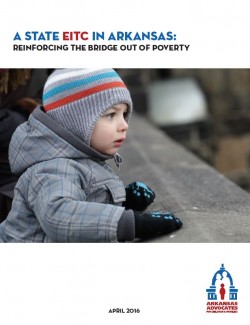
Tax day would certainly be a little happier for hundreds of thousands of working Arkansans if we had an Earned Income Tax Credit (EITC).
President Reagan called EITCs “the best anti-poverty, the best pro-family, the best job creation measure to come out of Congress.”
An Arkansas EITC would supplement the wildly successful federal version which helps working families across the nation make ends meet with credits at tax time. The credits are usually spent on catching up on bills, furthering education, or providing essentials for kids. A state EITC would be a powerful new anti-poverty and tax fairness tool in Arkansas, a tool that has proven to be incredibly successful in other states.
But don’t thousands of Arkansans already claim an EITC every year? That is true, but they are
only claiming the federal version. There is no state-level EITC in Arkansas. If the federal EITC
is a well-worn bridge out of poverty, a state EITC is a reinforcing beam. Most states (26 plus the District of Columbia) are putting in those reinforcing beams because they know how important and effective that bridge out of poverty is for millions of Americans.
You have to earn money to get an EITC, and it is designed to increase up to a certain income level, and then taper off when taxpayers achieve a more livable income range. Here are some of the ways a state-level EITC can be a turning point in the lives of working families:
- EITCs help people get and keep jobs. Individuals have to work to receive an EITC, and for the lowest income families, the credit increases with every dollar of earned income. That aspect encourages people to work and helps them move up the income ladder. Promoting work also lowers the need for social safety net programs.
- EITCs reduce poverty for good. Increased wages from the “pro-work” aspect of the EITC make it the single most effective program for reducing child poverty because when parents do better, kids do better, too. The EITC is responsible for lifting 6.2 million people out of poverty every year, including 3.2 million kids.
- EITCs improve outcomes for children across the board. Increases in EITCs have been linked to improved infant and maternal health, better test scores for elementary and middle school students, a better chance at attending college, and higher salaries decades down the road.
- EITCs improve the local economies where families live. Tax credit refunds are often spent close to home on things families need, like school clothes and supplies. Economists estimate that for every $1 in EITC, there is a $1.5 to $2 impact on the local economy.
Read more about how an Arkansas EITC would change the lives of our residents, plus view county-level data, in our newest report.
Plus, senior policy analyst and report author Ellie Wheeler shows how a state-level EITC could transform lives.


You must be logged in to post a comment.